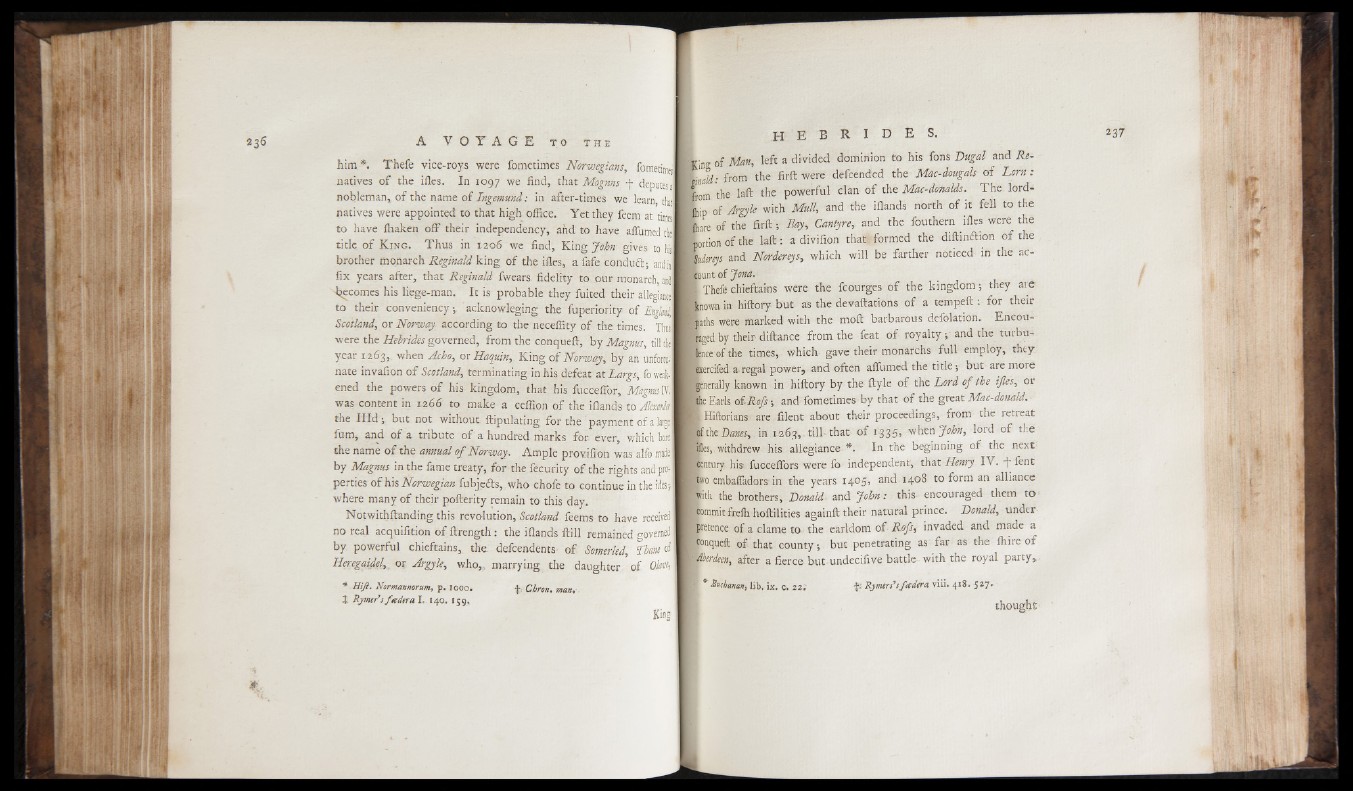
him*. Theft vice-roys were fometimes Norwegians, fomethJ
natives of the ifles. In 109.7 we find, that Mognns f deputes]
nobleman, of the name of Ingemund: in after-times we learn, tU
natives were appointed to that high office. Yet they feem at tiiJ
to have lhaken off their independency, and to have affumed tM
title of K i n g . Thus in 1 2 0 6 we find, King John gives, to W
brother monarch Reginald king of the ifles, afafe conduit; andin
fix years after, that Reginald fwears. fidelity to our monarch, aadj
•becomes his liege-man. It is probable they fuited their allegiance
to their conveniency; 'acknowleging the fuperiority of EnghA
Scotland, or Norway according to the neceffity of the times. TtiiJ
were the Hebrides governed, from the conqueft, by Magnus, till the]
year 1263, when Acho, or Haqitin, King of Norway, by an unfoiM
nate invafion of Scotland, terminating in his defeat at Largs, fo wealt-l
ened the powers o f his kingdom, that his fuccelTor, MogmsM
was content in 1.266 to make a ceffion o f the iflands to AlexalA
the Hid ; but not without ftipulating for the payment of a large!
fum, and- o f a tribute of a hundred marks for. ever, which bore]
the name o f the annual of Norway. Ample provifion was alfo made]
by Magnus in the fame treaty, for the fecurity of the rights and profl
perties of his Norwegian fubjefts, who chofe to continue in the ifc;
where many o f their pofterity remain to this day.
Notwithflranding this revolution, Scotland- feems to have received I
no real acquifition of ftrength: the iflands ftill remained governed
by powerful chieftains, the dependents of Somerled, Thant of
Heregaifel, or Argyle, w.ho„ marrying the daughter of OkV>
* Hift. Normannornm, p. iooo. f , Cbron. man,
t Rymer’sfed era l. 140, 159.
King'
L;n(J 0f Man, left a divided dominion to his fons Dugal and Re-
1 » , from the firftwere depended the Mac-dougals of Lorn:
r the powerful clan of the Mac-donalds. The lord-
•fr.ip * of Argyle with Mull, and the iflands north of it fell to the
¡hare of the firft; Ray, Cantyre, and the fouthern ifles were the
Bortion of the laft: a divifion that*: formed the diftindhon of the
Mstkreys and Nordereys, which will be farther noticed in the account
of Jona.
■ Thefe' chieftains were the fcourges o f the kingdom; they are
f known in hiftory but as the devaluations of- a tempeft : for their
Baths were marked with the moft barbarous defolation. Eneou-
Biged by their diftance from the feat o f royalty; and the turbu-
I lence of the times, which gave their monarchs full employ, they
Bsercifed a-regal powerand often affumed the title; but are more
Benerally known in hiftory by the ftyle of the Lord of the ijles, or
Hie Earls of.Rofs-, and fometimes by that of the great Mac-donald. ■
B Hiftorians are filent about their proceedings, from the retreat
t.'sf the Banes, in 1263,. till-that of 133S, when John, lord of the
Bes, withdrew- his allegiance *. In the beginning o f the next
ifentury his- fucceffors were fo independent, that Henry IV. -f-fent
■woembaffadors-in the years 1405, and 1408 to form an alliance
I with the brothers, Donald and John: this encouraged them to
Bommit freih hoftilities againft their natural prince. Donald, under
Bretence of a clame to the earldom of Rofs, invaded and made a
B °nTieft o f that county; but penetrating as far as the lhire of
Wdkrdeen, after a fierce- but-undecifive battle with the royal party,
■ * Svtbman, lib, ix. c. 22; ft Rjmtrs'sfadera viii. 41$. 527*
thought